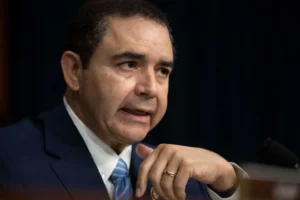Top Education Official Blasts Biden Proposal Impacting Transgender Student Athletes
State Superintendent Megan Degenfelder said the proposed Title IX rules amount to ‘federal overreach’
- Published In: Politics
- Last Updated: Apr 17, 2023

Wyoming Superintendent of Public Instruction Megan Degenfelder blasted a new Biden administration proposal concerning transgeder student athletes, as advocates threaten suit against a new Wyoming law barring trans girls' participation in school sports. (AP Photo/John Hanna, File)
By Jacob Gardenswartz
Special to the Wyoming Truth
A top Wyoming education official blasted a new policy proposed by President Joe Biden’s Department of Education impacting transgender athletes in schools. Cast by the administration as a compromise seeking to preserve the rights of transgender students and fairness for those competing against them, the new measure appears to have angered both advocates and opponents of transgender student protections.
In early April, the Education Department proposed a new rule amending Title IX, the federal civil rights law which bars discrimination based on sex in educational institutions that receive federal funding. If enacted, the policy would enable schools to block some transgender athletes from participating in school sports, but bar across-the-board bans — such as the one recently-imposed in Wyoming.
“Every student should be able to have the full experience of attending school in America, including participating in athletics, free from discrimination,” U.S. Secretary of Education Miguel Cardona said in a statement announcing the proposed rule change. “Being on a sports team is an important part of the school experience for students of all ages.”
Last week, however, Wyoming Superintendent of Public Instruction Megan Degenfelder announced her opposition to the proposal, describing it as “yet another example of the Biden administration’s aggressive federal overreach.”
“I will fight back against this federal overreach, just as I did for years working in the fossil fuel industry, and work to partner with my counterparts across the country to stand up to the Biden administration’s harmful regulations,” Degenfelder said in a statement.
Biden’s new proposal comes as 20 states, including Wyoming, have recently moved to enact laws or policies prohibiting transgender girls from participating in school sports. Senate File 133, passed by the Wyoming legislature in the 2023 general session, bars public school students “of the male sex” in grades seven through 12 from participating in “an athletic activity or team designated for students of the female sex.”
Bill sponsor Sen. Wendy Schuler (R-Evanston) claimed earlier this year the measure was needed to “keep the biological females at the forefront of the equation,” insisting “it’s their playing field, it’s their safety, it’s their welfare that should be uppermost.”
But opponents of the Wyoming law argued it amounted to a solution without a problem, noting the Wyoming High School Athletic Association already had a policy in place to handle such matters on a case-by-case basis.
In a statement announcing that he would allow the measure to become law, Wyoming Gov. Mark Gordon blasted it as “overly draconian” and “discriminatory,” though he opted not to utilize his veto.
Degenfelder, for her part, said she supported the Wyoming measure in her statement opposing Biden’s proposal. In an interview with the Wyoming Truth last year, she said she “[doesn’t] agree with having biological men play in those contact sports with women,” though she added such matters should be worked through “on an individual basis.”
State LGBTQ groups have said they intend to fight the new Wyoming law in court, though a formal complaint has yet to be filed. At the University of Wyoming, meanwhile, seven members of the Kappa Kappa Gamma sorority recently filed suit against the national chapter, alleging that by allowing a transgender student to join the sorority last fall, officials violated Kappa Kappa Gamma’s own bylaws, which state the organization is “single-gender.” On Friday, a federal judge ruled the women cannot remain anonymous, as they’d sought to do.
Wyoming leaders are not the only conservatives to lash out at the new Biden proposals. South Dakota Gov. Kristi Noem pledged she would “not allow this to stand,” while Alabama Attorney General Steve Marshall — representing a state which approved a trans sports ban in 2021 — threatened a lawsuit.
And it wasn’t just Republicans or critics of transgender rights who voiced opposition to the new policy. Several transgender advocates and LGBTQ rights groups spoke out against the new policy, arguing it gave schools a license to discriminate.
“I can’t read this any other way than a betrayal,” wrote prominent trans activist Erin Reed. “This entire document is worse than doing nothing.”
Rep. Alexandria Ocasio-Cortez (D-N.Y.) called the proposal “indefensible and embarrassing,” suggesting the Biden administration walk it back. White House and Education Department officials have thus far dodged questions about such critiques.
The proposed Education Department rule remains open to public comment for 30 days before it takes effect, barring any legal actions. But the question of how to preserve fairness in sports while protecting trans students’ rights remains far from settled.
Last week, the U.S. Supreme Court rejected West Virginia’s attempt to enforce its trans athlete ban, ruling in favor of Becky Pepper-Jackson, a transgender 12-year-old middle schooler who sought to continue competing on the girl’s track and field team. Though the high court declined to intervene in the case, allowing a lower court ruling blocking West Virginia’s law from being enforced, justices signaled they may soon take up the issue in another case.
And in the U.S. House, lawmakers are set to vote later this week on a controversial measure which would prohibit transgender and intersex students from competing in sports, going so far as to define sex as based “solely on a person’s reproductive biology and genetics at birth.”
In response, a coalition of professional and Olympic athletes, including Sue Bird and Megan Rapinoe, wrote an open letter decrying the legislation.
“If this bill passes, transgender and intersex girls and women throughout the country will be forced to sit on the sidelines, away from their peers and their communities,” the athletes wrote. “Denying children access to a place where they can gain significant mental and physical health benefits, and learn lifelong lessons that come from being part of a team and working hard towards your goals does not protect women in sports.”













